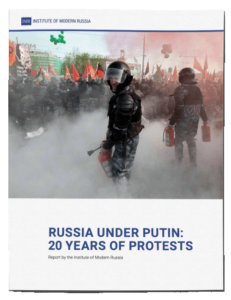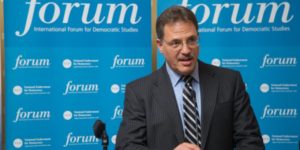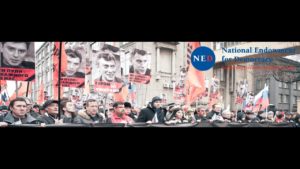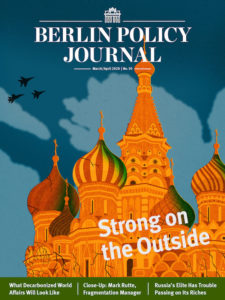 Protesters in Russia’s Far Eastern city of Khabarovsk, where rallies against President Vladimir Putin’s role in a regional political crisis have been going on for almost a month, have voiced their support for demonstrations against the presidential vote in Belarus, Radio Free Europe / Radio Liberty reports (HT:FDD).
Protesters in Russia’s Far Eastern city of Khabarovsk, where rallies against President Vladimir Putin’s role in a regional political crisis have been going on for almost a month, have voiced their support for demonstrations against the presidential vote in Belarus, Radio Free Europe / Radio Liberty reports (HT:FDD).
The Kremlin’s suppression of domestic dissent is one reason why a bipartisan group of former diplomats, military and intelligence professionals, and Russia experts dispute the argument of a recent open letter calling for a “rethink” of America’s Russia policy
America’s ability to bring about change in Russia might be very limited, says former assistant Secretary of State David J. Kramer, a senior fellow at Florida International University’s Steven J. Green School of International & Public Affairs.
But to resign ourselves to dealing with Russia “as it is, not as we wish it to be,” as the authors argue—that is, accepting Russia’s repression, kleptocracy and aggression—would provide no incentive for Putin to change. Instead, it would convey an over-eagerness on the American side for better relations, which Putin would exploit, he writes for POLITICO:

Levada
Such a stance also runs counter to America’s values, interests and principles, and, just as importantly, fails to keep faith with the Russian people as their patience with the regime runs thin…. Putin feels he needs to stimulate and exploit nationalist sentiment to maintain his grip on power. But contrary to the letter writers’ claim that “Russia, under Vladimir Putin, operates within a strategic framework deeply rooted in nationalist traditions that resonate with elites and the public alike,” only 3 percent of Russians consider the United States an enemy, according to a Levada Center (right) survey from earlier this year. Putin increasingly is out of touch with the Russian people.
Instead of resetting relations with the Putin regime, here’s what America should do, say the signatories (see below), who include friends and associates of the National Endowment for Democracy (NED):
- Recognize the Putin regime’s corruption, aggression toward neighboring states, increased muscle-flexing and repression at home as threats.
- Provide the American public with timely, more in-depth information regarding Russia’s actions.
- Work with our allies, especially NATO and the European Union, to contain and confront this threat.
- Differentiate the Russian regime from the Russian people writ large, and prioritize support for civil society and those who, at great risk to themselves, are advocating for their fundamental rights…..RTWT
Victor Ashe, Former U.S. ambassador to Poland
Anders Aslund, Senior fellow, Atlantic Council
Ian Brzezinski, Former deputy assistant secretary of Defense for Europe and NATO policy
Debra Cagan, Distinguished energy fellow, Transatlantic Leadership Network
Ralph Clem, Maj. Gen. USAF (Ret.), Emeritus professor, Florida International University
Heather Conley, Former deputy assistant secretary of State for European & Eurasian affairs
Susan Corke, Senior fellow, German Marshall Fund and director of Transatlantic Democracy Working Group
Charles Davidson, Publisher, The American Interest
Orest Deychakiwsky, Former senior policy adviser, Commission on Security and Cooperation in Europe (Helsinki Commission)
 Larry Diamond (right), Senior fellow, Hoover Institution, Senior fellow, Freeman Spogli Institute for International Studies
Larry Diamond (right), Senior fellow, Hoover Institution, Senior fellow, Freeman Spogli Institute for International Studies
Norm Eisen, Former U.S. ambassador to the Czech Republic
Evelyn Farkas, Former deputy assistant secretary of Defense for Russia/Ukraine/Eurasia
Jamie Fly, Former president, Radio Free Europe/Radio Liberty
Jeff Gedmin, Former president, Radio Free Europe/Radio Liberty
Steven L. Hall, Former member of the Senior Intelligence Service, CIA
 Melinda Haring, Deputy director, Eurasia Center, Atlantic Council
Melinda Haring, Deputy director, Eurasia Center, Atlantic Council
John Herbst, Director of the Eurasia Center at the Atlantic Council, Former U.S. ambassador to Ukraine and to Uzbekistan
Mark Hertling, Lt. Gen. (Ret.), former commander, U.S. Army Europe
Ben Hodges, Lt. Gen. (Ret.), former commander, U.S. Army Europe, Pershing chair in strategic studies, Center for European Policy Analysis
Don Jensen
Jonathan Katz, Former deputy assistant administrator, Europe and Eurasia bureau, USAID
Director of Democracy Initiatives, German Marshall Fund of the United States
Richard Kauzlarich, Former U.S. ambassador to Azerbaijan and to Bosnia-Hercegovina
Ian Kelly, Former U.S. ambassador to the Organization for Security and Cooperation in Europe and to Georgia
 John Kornblum, Former U.S. assistant secretary of State for European & Eurasian affairs
John Kornblum, Former U.S. assistant secretary of State for European & Eurasian affairs
Former U.S. ambassador to Germany
David J. Kramer, Former assistant secretary of State for democracy, human rights and labor
Senior fellow, Steven J. Green School of International & Public Affairs, Florida International University
Molly McKew, Writer
David A. Merkel, former deputy assistant secretary of State for European & Eurasian affairs, Former director, National Security Council
Marc Polymeropoulos, Senior Intelligence Service, Directorate of Operations, CIA (retired)
Benjamin L. Schmitt, Harvard postdoctoral fellow, Former European energy security adviser, U.S. Department of State
John Sipher, Former member of the Senior Intelligence Service, CIA
William Taylor, Former U.S. ambassador to Ukraine
 Kurt Volker, Former U.S. ambassador to NATO and U.S. special representative for Ukraine negotiations, Distinguished fellow, Center for European Policy Analysis
Kurt Volker, Former U.S. ambassador to NATO and U.S. special representative for Ukraine negotiations, Distinguished fellow, Center for European Policy Analysis
Brian Whitmore, Senior fellow, Center for European Policy Analysis, Founder and host of Power Vertical podcast
Note: All signers are acting in their personal capacity. Institutional affiliations are listed for purposes of identification only and do not imply institutional support for the content of the letter.







